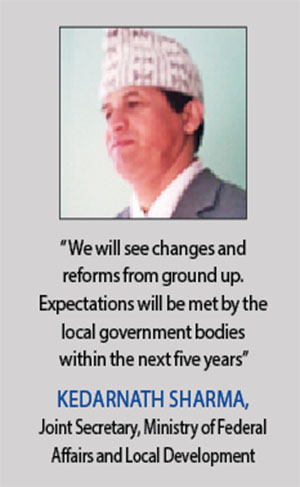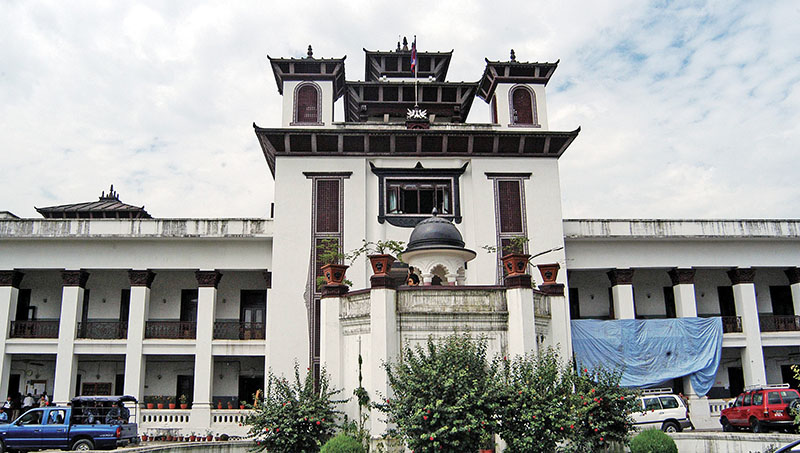Educate voters
Emphasise on voter education for the upcoming second phase of local elections
Kathmandu
The much-awaited local level election was conducted for the first time after a gap of 20 long years on May 14. On this day, the public in three provinces (3,4 and 6) exercised their right to choose local representatives for the development of their respective localities.
However, several issues ranging from insufficient voter education, lax security, tedious vote counting process et cetera were encountered during and after the first phase of voting. Such factors adversely affect the democratic practice and system of that governs the nation. To avoid repetition of these problems the government, Election Commission (EC) and concerned officials must learn from the mistakes made in the first phase.
The second phase of the election is just around the corner and the window from now and then must be utilised to raise awareness among the general public about the do’s and don’ts while voting.
According to Surya Prasad Aryal, Under Secretary and Information Officer at EC, more than three per cent of votes were disqualified in the first phase of the election. As every vote is crucial, the percentage of invalid votes, though sounding minimal, makes a big impact on the outcome of the voting. These issues must be dealt with zero-tolerance policy by the EC in the upcoming local elections in provinces 1, 2, 5 and 7.

Anita Khonju, a voter at first phase election shares, “Due to the large size of the ballot paper with n number of party symbols, I was confused. It took me a while to figure out what symbol represented whom. The dim light at the voting booth didn’t help either.”
Aryal agrees that the EC lacked systematic management in the first phase election, he shares, “Lack of time to prepare and insufficient volunteers to disseminate information about the voting process and to educate voters was a weakness on EC’s part. We should have foreseen this problem and prepared in advance.” Regarding invalid votes, he states that there could’ve been various reasons behind this — limited knowledge about how to vote properly may be one of the reasons while voters may also have had intentionally tampered with their votes knowing that it would be rejected.
The enthusiastic participation of people in the first phase polls amounting to 74 per cent of total voters turnout is commendable. However, the missing 26 per cent voters comprise of people residing out of the country, and staff engaged in election duties who missed out on exercising their voting rights. Aryal states that there is no provision to ensure that they get to exercise their voting rights.
Better voter education
To save the votes from being disqualified like in the first phase of the elections, the EC has roped in more volunteers who have been given the responsibility to educate voters. Surya Prasad Sharma, Joint Secretary and Spokesperson of EC, shares, “EC has made mandatory for volunteers to go to every household and educate voters.” Aryal informs, “There were 8000-9000 volunteers mobilised for the first phase election with two volunteers for each village council but now we have moved 21,000 volunteers, three to four for each village council to prepare voters of provinces 1, 2, 5 and 7 for the second phase of the election.” He further adds that more than two lakhs personnel will be engaged in the second phase of the election.
local governance
Except Bharatpur Metropolitan City, with the completion of vote counting, the winning representatives in provinces 3, 4 and 6 have started work governed by their duties and responsibilities in their respective areas. The election has now distributed the centralised power of Singha Durbar to the local units. Kedarnath Sharma, Joint Secretary of Ministry of Federal Affairs and Local Development (MoFALD), informs that the local government will be governed by Local Level Governance Act which is currently in parliament and not yet passed. However, this will not interrupt their
current development activities.
He says that the government has allocated sufficient budget for local levels in current fiscal year 2017/18 amounting Rs 225.05 billion which is 17.6 per cent of the total budget. The budget will be distributed in four installments.
To support the newly-elected local government bodies and to guide them in spending their allocated budgets, representatives of Nepal Planning Commission, Ministry of Finance and MoFALD have established a committee that will pass specific guidelines for them to follow.
He further says that the chances of smooth flow of work through local government bodies in the first year of election itself might be slim given the time required to set up management and infrastructure. “However, the local government will now focus on the priority sectors and necessities of the public. We will see changes and reforms from ground up. Expectations will be met by the local government bodies within the next five years,” Sharma asserts.






